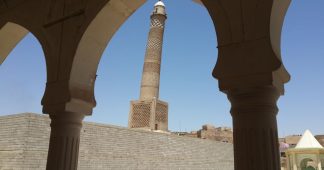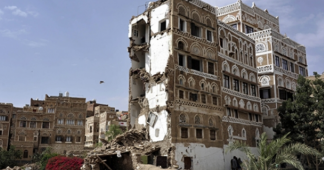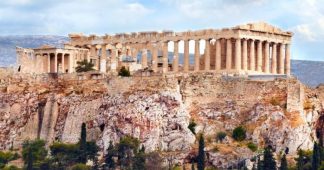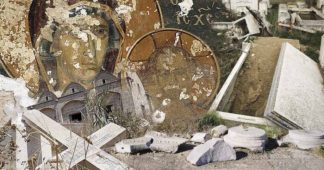The United States and its allies ignored the warnings of organizations and scholars concerning the protection of Iraq’s cultural heritage, including museums, libraries, archaeological sites and other precious repositories. Arsonists badly burned the National Library and looters pillaged the National Museum. Looters also damaged or destroyed many historic buildings and artifacts. The US constructed a military base on the site of ancient Babylon. Coalition forces destroyed or badly damaged many historic urban areas and buildings, while thieves have ruined thousands of incomparable, unprotected archeological sites.
GPF Perspectives
See GPF’s “War and Occupation in Iraq Report” section on the Destruction of Cultural Heritage (June 2007)
Articles
2015
A few days ago, on 26 September 2015, the first suspect in the Mali investigation, Ahmad Al Mahdi Al Faqi was surrendered to the International Criminal Court (ICC) by the authorities of Niger. The charges against him centre on the destruction of cultural heritage during the war in Mali 2012. It is the first case at the ICC in which war crimes against cultural heritage are the main accusation, which is particularly timely in light of the vicious trend of deliberate destruction of cultural heritage we have witnessed in Syria and Iraq at the hands of Islamic State.
The systematic destruction of cultural heritage at the hands of the Islamic State (March 9, 2015)
A new article by Marina Lostal on the recent destruction of cultural heritage in Iraq. Iraqi officials have reported that, last Saturday 7 of March, the Islamic State destroyed Hatra, a 2,000-year-old fortified city around 100 km south-west of Mosul. The Islamic State is believed to have bulldozed the site and looted the cultural artifacts housed inside, including gold and silver objects. The Director-General of UNESCO, Irina Bokova, has declared that “[t]he destruction of Hatra marks a turning point in the appalling strategy of cultural cleansing underway in Iraq.”
UN Security Council banning all trade with Syrian antiquitie (March 3, 2015)
An article by Marina Lostal about the UN Security Council banning all trade with Syrian antiquities. On 12 February 2015 the UN Security Council adopted Resolution 2199 (2015) banning all trade with Syrian antiquities removed from the country since 15 March 2011 and reaffirming the same prohibition concerning Iraqi cultural objects illegally exported since 6 August 1990. (Un Security Council)
Syria’s world cultural heritage and individual criminal responsibility (February 25, 2015)
Recent reports have confirmed damage to five of the six Syrian world heritage sites during the current armed conflict as well as extensive looting of several of its archaeological sites on the Syrian Tentative List of world heritage. This article examines the role and fate of Syrian world cultural heritage from the beginning of the conflict, maps out the different cultural property obligations applicable to Syria while illustrating, where possible, how they may have been violated. Then, it assesses if and how those responsible for these acts can be prosecuted and punished. The analysis reveals an accountability gap concerning crimes against Syrian world cultural heritage. As such, the article proposes to reinstate the debate over crimes against common cultural heritage which once arose in the context of the Buddhas of Bamiyan (International Review of Law)
2010
Iraq’s Ancient Ruins Face New Looting (June 25, 2010)
Another wave of looting has engulfed Iraq’s archaeological sites as an understaffed “antiquities police” struggles to protect them. In the chaos surrounding the US invasion in 2003, looters ransacked many of such sites leading to an immeasurable loss of artifacts from the Mesopotamian civilization. Since then, preservation and protection of these sites has hardly been a top priority for the US-trained Iraqi Federal Protection Police. The “antiquities police” was created for this purpose in 2008; however it remains poorly funded and hardly has enough staff to protect its own headquarters. (New York Times)
2008
Babylon’s History Swept Away in US Army Sandbags (December 8, 2008)
Archeologists say the ancient site of Babylon paid an extremely high price after the US used the site as military headquarters for 5 months. British Museum curator John Curtis calls the US action to build a base on the site as “ignorant and stupid” and says the 170 meter long and two meter deep trenches have caused irreversible damage. (Agence France-Presse)
Iraq: Can Ancient Babylon be Rescued? (November 12, 2008)
The US invasion of Iraq has seriously damaged the ancient city of Babylon. Iraqi officials state that US and Polish forces, from 2003 until 2005, greatly harmed the archeological site by using it as a military base. A UN report, due early in 2009, will examine the damage caused by the US and Polish military during this period. (Associated Press)
Iraq Reclaims 1,000 Artifacts Smuggled into US over Past Two Years (September 18, 2008)
US customs officials have returned more than 1,000 stolen Iraqi artifacts, found in the US, to the Iraqi embassy in Washington. The scale of the recovered antiquities suggests that illegal excavations and smugglings continue. Suspected involvement by US personnel in the theft of artifacts calls into question previous US officials’ assertions that Iraqi “extremists” were to blame for the sale of stolen Iraqi artifacts. (Azzaman)
Iraq’s Antiquities Looted (July 31, 2008)
During the 2003 US-led invasion thieves looted and destroyed Iraq’s archaeological treasures. Important sites remain unguarded and the country has lost priceless historical artifacts. Director of Oriental Science at the German Archaeological Institute in Berlin, Margarete van Ess, estimates that illegal excavation in Iraq has caused $10 billion worth of damage. (Institute for War and Peace Reporting)
Iraqi Officials Implicated in Smuggling of Antiquities (May 13, 2008)
A leading expert at the British Museum has revealed that members of the Kuwaiti ruling family, officials from the governments of Iraq and Turkey and regional gangs within Iraq possess antiquities looted during the earliest phases of the US occupation of Iraq. In a show of complete disregard for the importance of culture and history, Norwegian businessman, Martin Schoyen, has even “opened a private museum carrying his name in which he is displaying 6,000 smuggled pieces he bought via mediators.” (Az-Zaman)
Iraq’s Ruined Library Soldiers On (April 9, 2008)
Often called the cradle of civilization, Iraq was also a major center of early scholarship and home to the world’s first library. US troops failed to protect the Iraq National Library and Archives (INLA) from looting in 2003. Although this led to the loss of “as many as 60 percent of the Ottoman and Royal Hashemite era documents, the bulk of Ba’ath era documents and 25 percent of the book collections,” the budgets for rebuilding the INLA have been pitifully small. (The Nation)
2007
British and American Collusion in the Pillaging of Iraq’s Heritage Is A Scandal That Will Outlive Any Passing Conflict (June 8, 2007)
This Guardian article describes how, four years into the occupation, Iraq’s cultural heritage continues to be destroyed. The US has used the 10th-century caravanserai of Khan al-Raba for exploding seized insurgent weapons, and looters continue to systematically plunder some of the thousands of sites of incomparable historical importance. By not protecting Iraq’s culture, the US and the UK are in contravention of their obligations under the Geneva Conventions, which state that occupying powers must “use all means within [their] power” to preserve the cultural heritage.
Desecration of the Cradle of Civilization (April 15, 2007)
This Independent article points out that the destruction of Iraq’s cultural treasures continues unabated. Looters protected by their own private armies are digging into Iraq’s archeological sites in search of artifacts to sell to the US and European markets. The illegal digging is destroying entire ancient cities and, according to a professor at the British School of Archeology in Iraq, “a country’s past is disappearing while we stand and watch.” In violation of the Hague Convention, the Coalition forces have failed to protect some of the world’s most precious archeological sites.
2006
Iraq’s Head of Antiquities Quits After Looting of Ancient Treasures (August 28, 2006)
Dismayed by the continuous looting of Iraq’s irreplaceable ancient artifacts, Donny George, head of Iraq’s Antiquities Board, has quit his post after unsuccessful attempts to safeguard 5,000 years of history. George cited a lack of funding as the purpose for his departure, as well as mounting pressure by Shiite officials to emphasize the protection of Iraq’s Islamic heritage over earlier civilizations that pre-date Islam. (Washington Post)
Academia’s Killing Fields (February 28, 2006)
As the “cradle of civilization,” Iraq is well known for its cultural and intellectual heritage. However, years of turbulence have eroded this legacy. During the 13 years of US- and UK-driven UN sanctions, many Iraqi academics, doctors, and scientists fled the country. Following the US-led invasion and occupation, Iraqi professors have been subject to murder, kidnapping, and arrest. By some estimates, as many as 500 prominent academics have “disappeared” or been murdered. (Islam Online)
2005
Looted Iraqi Relics Slow to Surface (November 8, 2005)
Thousands of Iraq’s most famous historical artifacts have been stolen, the Washington Post reports. Widespread looting has continued since the 2003 US-led invasion, and occupation forces have not made protection of Iraq’s cultural heritage a priority. Given the value of stolen works and the nature of the art trade, most experts doubt that Iraq’s most famous artifacts will ever resurface.
Damaged University Science Labs Are Desperately Short of Equipment (October 9, 2005)
Scientific research and education in Iraq have suffered as a result of the US-led invasion. Many university laboratories lack necessary supplies while others have been completely destroyed. Though legislators have proposed to increase funding for equipment and facilities, security needs take priority in budgetary considerations. (Integrated Regional Information Networks)
For Sale: A Nation’s Treasures (July 2, 2005)
The looting of Iraq’s cultural treasures continues unabated. While some of the plunder is small-scale, large organized gangs are bulldozing sites and selling artifacts on the black market, and Iraqi officials believe the proceeds end up in the insurgents’ hands. In response to the looting, vandalism and military occupation, the World Monuments Fund has put Iraq on its list of most endangered sites, “the first time that it has listed an entire country.” (Times, London)
At Least 8,000 Treasures Looted from Iraq Museum Still Untraced (May 24, 2005)
More than half the items looted from the Iraq National Museum in Baghdad have yet to be traced or recovered. The author of this Independent piece describes the looting as “evidence of how quickly and irretrievably a country can be stripped of its cultural heritage.” To make matters worse, the full extent of the damage cannot be gauged due to the “deteriorating” security condition.
Halliburton Destroys Babylon (March 28, 2005)
Babylon, one of the world’s most important archeological sites, has been badly damaged by terrorist attacks, which began when Halliburton built US Camp Babylon at the location of the ancient city. The Iraqi Culture Minister has called for a full investigation to evaluate the damage caused and the level of reparations the ministry should request. (The Nation)
2003
Troops Vandalise Ancient City of Ur (May 17, 2003)
The city of Ur was vandalized by US troops according to aid workers. Ur is home to many ancient monuments and it is believed to be the birthplace of the prophet Abraham. (Observer)
“Cultural Catastrophe” Hits Iraq (April 24-30, 2003)
International experts meeting at UNESCO have deplored the looting of Iraq’s cultural heritage in the wake of the US-led invasion, and have called upon the occupying forces to immediately secure Iraq’s cultural sites and institutions. (Al-Ahram Weekly)
Expert Thieves Took Artifacts, UNESCO Says (April 18, 2003)
According to UNESCO, organized thieves were involved in the looting of priceless artifacts from Baghdad’s National Museum of Antiquities. FBI agents are being dispatched to Baghdad to conduct a criminal investigation into the losses. (Washington Post)
Convention for the Protection of Cultural Property in the Event of Armed Conflict
This is a link to the 1954 Hague Convention for the Protection of Cultural Property in the Event of Armed Conflict. The convention is being breached by excessive destruction of historical artifacts in Iraq.
Pillagers Strip Iraqi Museum of Its Treasure (April 12, 2003)
Looters vandalized the National Museum of Iraq following the fall of Saddam Hussein’s rule, destroying priceless artifacts from over 7000 years of cultural and archaeological heritage. (New York Times)
Scholars Move to Protect “Priceless” Iraqi Heritage (March 21, 2003)
A statement signed by more than 100 distinguished scholars in the US and Europe emphasized the “grave danger” posed to the priceless cultural heritage of Iraq by the US-led war. The statement calls on all governments to respect the international protocol protecting cultural property in armed conflict. (Guardian)
Iraq War Could Put Ancient Treasures at Risk (March 3, 2003)
Scholars are worried that a US-led war against Iraq could threaten the country’s antiquities. The Archaeological Institute of America has issued a statement calling on “all governments” to protect cultural sites both during and after a war. (Washington Post)
War in Iraq Would Halt All Digs in Region (February 25, 2003)
War in Iraq will put a halt to archeology in the Middle East and researchers fear post-war looting could cause damage to important archeological sites. (New York Times)
Oldest Human History Is at Risk (February 25, 2003)
Holland Cotter describes valuable archeological sites in Iraq ranging from Babylon with symbolic importance for Judo-Christians to different Islamic monuments in Basra. These sites could be destroyed during a war or looted during post-war instability. (New York Times)
2002
Concern for Cultural Heritage in Iraq (December 18, 2002)
Archaeological Institute of America (AIA) passed a resolution after the 1990 Gulf War urging all governments to respect the 1954 Convention for the Protection of Cultural Property in the Event of Armed Conflict. AIA now re-emphasizes the resolution out of fear that a war on Iraq would threaten some of the world’s most important archaeological sites.
Published at https://www.globalpolicy.org/humanitarian-issues-in-iraq/consequences-of-the-war-and-occupation-of-iraq/35721.html











